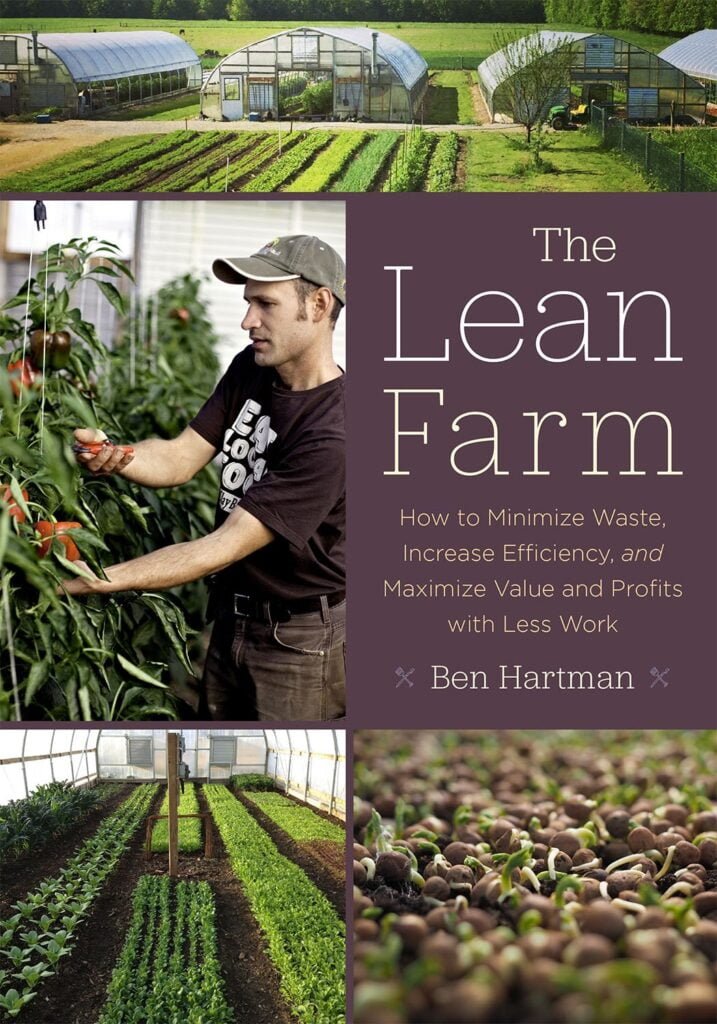Efficiency in Sustainable Agriculture: The Lean Farm Approach

Sustainable agriculture is an approach that seeks to balance agricultural production with care for the environment and the well-being of farmers and consumers. It is based on practices that increase efficiency and minimize the impact on natural resources. In this sense, the Lean Farm approach is presented as an important tool for achieving greater efficiency in sustainable agriculture.
- What is sustainable agriculture? Sustainable agriculture is an agricultural practice that seeks to meet current food production needs without compromising the ability of future generations to meet their own needs. It is based on a combination of techniques and practices that are environmentally friendly, socially just and economically viable. Sustainable agriculture aims to minimize the negative impact on the environment while maximizing yields and productivity. This is achieved through the implementation of soil management practices, water management, efficient use of resources, protection of biodiversity, and promotion of the health and well-being of farmers and consumers. What is the Lean Farm approach?
- Benefits of efficiency in sustainable agriculture
- Principles of the Lean Farm approach
- Application of the Lean Farm approach in agriculture
- Results and success stories in the application of the Lean Farm approach
- Conclusions and recommendations for implementing the Lean Farm approach in sustainable agriculture
- Additional resources on efficiency in sustainable agriculture and the Lean Farm approach
What is sustainable agriculture?
Sustainable agriculture is an agricultural practice that seeks to meet current food production needs without compromising the ability of future generations to meet their own needs. It is based on a combination of techniques and practices that are environmentally friendly, socially just and economically viable.
Sustainable agriculture aims to minimize the negative impact on the environment while maximizing yields and productivity. This is achieved through the implementation of soil management practices, water management, efficient use of resources, protection of biodiversity, and promotion of the health and well-being of farmers and consumers.
What is the Lean Farm approach?
The Lean Farm approach is a methodology that has been used successfully in the manufacturing industry and is now being applied to agriculture. It is based on the Lean system, which was developed by Toyota in Japan in the 1950s. The main objective of the Lean Farm approach is to minimize waste, increase efficiency and improve profitability.
The Lean Farm approach is based on principles such as respect for workers, continuous improvement and commitment to quality. It focuses on identifying and eliminating waste at every stage of the agricultural production process, from planting to final sale. This is achieved through the use of tools and techniques such as value stream mapping, Kaizen (continuous improvement), 5S (seiri, seiton, seiso, seiketsu, shitsuke), among others.
Benefits of efficiency in sustainable agriculture
Efficiency in sustainable agriculture has numerous benefits for both farmers and the environment. By improving efficiency at all stages of the agricultural production process, the following benefits can be achieved:
1. Cost reduction: By eliminating waste and optimizing resources, farmers can reduce production costs. This can include reducing inputs, such as water, fertilizers and pesticides, as well as reducing labor costs.
2. Improved productivity: By eliminating obstacles and waste, farm productivity can be improved. This translates into more product produced in less time, which in turn can increase the farmer's profits.
Improved product quality: By eliminating waste and optimizing processes, the quality of agricultural products can be improved. This can result in fresher, more nutritious and tastier products, which in turn can generate higher demand and better prices in the market.
4. Environmental protection: By minimizing the use of natural resources and reducing waste generation, sustainable agriculture can help protect the environment. This includes conserving soil, water and biodiversity, as well as reducing air and water pollution.
5. Improved quality of life for farmers: By reducing workload, improving profitability and protecting the environment, efficiency in sustainable agriculture can improve farmers' quality of life. This can include greater job satisfaction, improved health and well-being, and greater financial stability.
Principles of the Lean Farm approach
The Lean Farm approach is based on the following principles:
Identification and elimination of waste: Farmers should take the time to observe and analyze their production processes and identify areas of waste. This may include overproduction, waiting times, unnecessary transportation, excess inventory, unnecessary movements and defects.
2. Prioritization of quality: The quality of agricultural products must be the top priority. This involves ensuring that products meet established quality standards and that customers are satisfied with the products they receive.
3. Focus on the value stream: Farmers should focus on the value stream, which is the set of activities that add value to the agricultural product or service. This includes all stages from planting to final sale. By eliminating waste and optimizing the value stream, efficiency can be improved and costs reduced.
4. Worker participation and empowerment: Farmers should involve workers in the identification and elimination of waste. This involves recognizing their knowledge, skills and experience, and empowering them to take an active part in the continuous improvement of agricultural processes.
5. Continuous improvement: Farmers must be constantly looking for ways to improve and optimize their farming processes. This implies the application of the Kaizen philosophy, which is the constant search for gradual and continuous improvement over time.
Application of the Lean Farm approach in agriculture
The application of the Lean Farm approach in agriculture involves the implementation of specific practices and techniques at each stage of the agricultural production process. Some of these practices include:
1. Farm planning and design: Before starting any agricultural activity, it is important to carry out adequate planning and design the farm in an efficient manner. This involves taking into account crop requirements, water availability, access to markets, among other factors. Efficient farm design can reduce the need for unnecessary transportation and improve efficiency in the value stream.
 Growing Mushrooms: Tools for Success
Growing Mushrooms: Tools for SuccessSoil and crop management: The Lean Farm approach promotes techniques such as crop rotation, the use of natural fertilizers, row planting and the use of efficient irrigation systems. These practices maximize crop production, reduce soil erosion and minimize the need for chemical inputs.
3. Pest and disease control: The Lean Farm approach promotes the constant monitoring of pests and diseases, as well as the implementation of integrated pest management methods. This involves the use of biological techniques, such as the introduction of natural enemies, the selection of resistant crop varieties, and the use of traps and physical barriers.
4. Efficient water management: The Lean Farm approach promotes practices to reduce water consumption and minimize waste. This includes the use of efficient irrigation systems, rainwater harvesting and storage, reuse of irrigation water, and the application of drip or micro-sprinkler irrigation techniques.
5. Harvest and post-harvest optimization: The Lean Farm approach promotes the optimization of harvest and post-harvest processes. This involves proper planning of harvesting activities, sorting and grading of produce, optimization of packing and storage methods, and minimization of unnecessary waiting and transportation times.
Results and success stories in the application of the Lean Farm approach
The application of the Lean Farm approach in agriculture has demonstrated numerous success stories around the world. Some examples include:
- Gaining Ground Farm in the United States has been able to reduce production costs and increase efficiency using the Lean Farm approach. They have implemented practices such as value stream mapping, continuous improvement and worker training. This has led to a reduction in waste and an increase in farm profitability.
- Polyface Farm in Virginia, USA, is another example of successful application of the Lean Farm approach. This farm uses practices such as crop rotation, grazing management and efficient water utilization. In addition, they have implemented more efficient production techniques, such as raising animals in mobile systems and direct-to-consumer sales.
- In Europe, the Demeterhof Wilzmühle bio-dynamic farm in Germany has implemented the Lean Farm approach to improve the efficiency and sustainability of its farming processes. They have optimized crop production, improved soil management techniques and reduced unnecessary waiting and transport times.
These success stories demonstrate that the application of the Lean Farm approach in agriculture can generate positive results in terms of both operational efficiency and environmental sustainability.
Conclusions and recommendations for implementing the Lean Farm approach in sustainable agriculture
.
The implementation of the Lean Farm approach in sustainable agriculture can be beneficial to farmers by reducing costs, increasing productivity and improving the quality of agricultural products. In addition, it can be beneficial to the environment by minimizing the negative impact on natural resources and reducing waste generation.
To implement the Lean Farm approach in agriculture, it is recommended:
1. Read the book "The Lean Farm" by Ben Hartman, which provides a practical and detailed guide on how to apply the Lean Farm approach in agriculture.
2. Conduct a detailed analysis of agricultural production processes to identify waste and areas for improvement.
3. Train workers in the principles and techniques of the Lean Farm approach.
4. Establish clear improvement goals and measure the results in order to make continuous adjustments and improvements.
5. Seek expert advice and support in the Lean Farm approach to maximize benefits and minimize challenges.
Implementing the Lean Farm approach to sustainable agriculture can be an effective strategy to improve efficiency, reduce waste and increase profitability. By implementing the principles and techniques of the Lean Farm approach, farmers can achieve greater environmental sustainability, improve the quality of farm products, and increase farmer satisfaction and quality of life.
Additional resources on efficiency in sustainable agriculture and the Lean Farm approach
- "The Lean Farm Guide to Growing Vegetables" by Ben Hartman.
- "The Lean Farm Guide to Growing Strawberries" by Ben Hartman.
- "The Lean Farm Guide to Growing Cut Flowers" by Ben Hartman.
- "The Lean Farm Guide to Growing Seed" by Ben Hartman.
- "The Lean Farm Guide to Growing Tools" by Ben Hartman.
- "The Lean Farm Guide to Growing Profit" by Ben Hartman.
These resources provide more details on the application of the Lean Farm approach in agriculture and provide practical tips for maximizing efficiency and sustainability in agricultural production.
 The Top 10 Perennial Vegetables: A Guide for a Sustainable Garden
The Top 10 Perennial Vegetables: A Guide for a Sustainable Garden
Leave a Reply